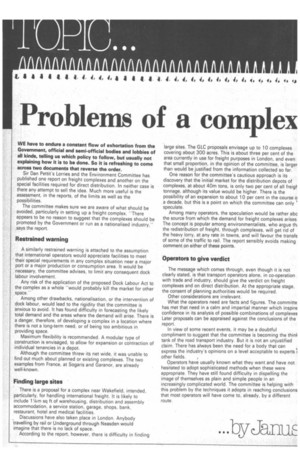Problems of a complex
Page 62

If you've noticed an error in this article please click here to report it so we can fix it.
WE have to endure a constant flow of exhortation from the Government, official and semi-official bodies and lobbies of all kinds, telling us which policy to follow, but usually not explaining how it is to be done. So it is refreshing to come across two documents that reverse the order.
Sir Dan Pettit's Lorries and the Environment Committee has published one report on freight complexes and another on the special facilities required for direct distribution. In neither case is there any attempt to sell the idea. Much more useful is the assessment, in the reports, of the limits as well as the possibilities.
The committee makes sure we are aware of what should be avoided, particularly in setting up a freight complex. "There appears to be no reason to suggest that the complexes should be promoted by the Government or run as a nationalised industry,:says the report.
Restrained warning
A similarly restrained warning is attached to the assumption that international operators would appreciate facilities to meet their special requirements in any complex situation near a major port or a major production or consumption area. It would be necessary, the committee advises, to limit any consequent dock labour involvement.
Any risk of the application of the proposed Dock Labour Act to the complex as a whole "would probably kill the market for other space.
Among other drawbacks, nationalisation, or the intervention of dock labour, would lead to the rigidity that the committee is anxious to avoid. It has found difficulty in forecasting the likely total demand and the areas where the demand will arise. There is a danger. therefore, of developing a complex in a location where there is not a long-term need, or of being too ambitious in providing space.
Maximum flexibility is recommended. A modular type of construction is envisaged, to allow for expansion or contraction of individual tenancies in a depot.
Although the committee threw its net wide, it was unable to find out much about planned or existing complexes. The two examples from France, at Sogaris and Garanor, are already well-known.
*Finding large sites There is .a proposal for a complex near Wakefield, intended, particularly, for handling international freight. It is likely to include 11/4m sq ft of warehousing, distribution and assembly accommodation, a service station, garage, shops, bank, restaurant, hotel and medical facilities.
Discussions have also taken place in London_ Anybody travelling by rail or Underground through Neasden would imagine that there is no lack of space.
According to the report, however, there is difficulty in finding large sites. The GLC proposals envisage up to 10 complexes covering about 300 acres. This is about three per cent of the area currently in use for freight purposes in London, and even that small proportion, in the opinion of the committee, is larger than would be justified from the information collected so far.
One reason for the committee's cautious approach is its discovery that the initial market for the distribution depots of complexes, at about 40m tons, is only two per cent of all freigltonnage, although its value would be higher. There is the possibility of an expansion to about 10 per cent in the course o a decade, but this is a point on which the committee can only speculate.
Among many operators, the speculation would be rather abo the source from which the demand for freight complexes arises. The concept is popular among environmentalists, who argue VI the redistribution of freight, through complexes, will get rid of the heavy lorry, at any rate in towns, and will favour the transfe of some of the traffic to rail. The report sensibly avoids making comment on either of these points.
Operators to give verdict
The message which comes through, even though it is not clearly stated, is that transport operators alone, in co-operation with trade and industry, should give the verdict on freight complexes and on direct distribution. At the appropriate stage, the consent of planning authorities would be required.
Other considerations are irrelevant.
What the operators need are facts and figures. The committe has met that need in a calm and impartial manner which inspire confidence in its analysis of possible combinations of complexes Later proposals can be appraised against the conclusions of the report_ In view of some recent events, it may be a doubtful compliment to suggest that the committee is becoming the thin!. tank of the road transport industry. But it is not an unjustified claim. There has always been the need for a body that can express the industry's opinions on a level acceptable to experts other fields.
Operators have usually known what they want and have not hesitated to adopt sophisticated methods when these were appropriate. They have still found difficulty in dispelling the image of themselves as plain and simple people in an increasingly complicated world. The committee is helping with this problem by the techniques it adopts in reaching conclusions that most operators will have come to, already, by a different route.




































































































